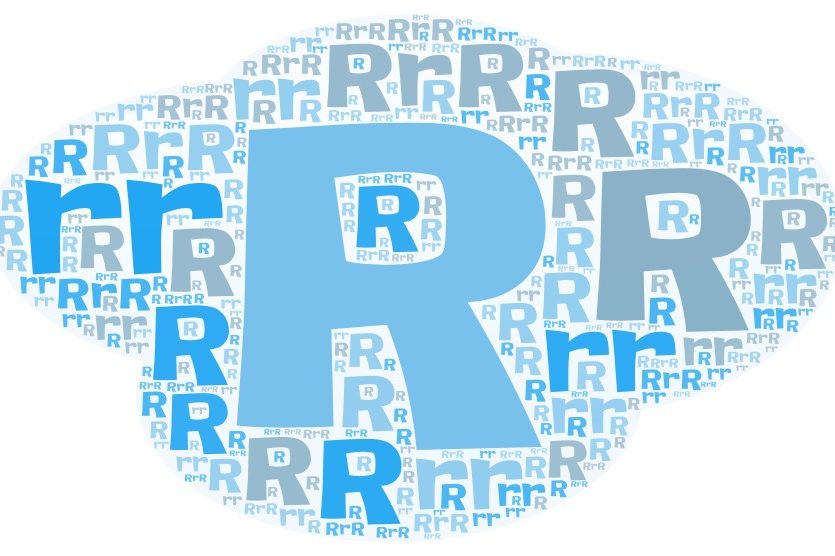Trilled r’s, tapped r’s, labial r’s, or retroflex r’s: there is no consonant in the English language that has so many phonetic representations. Let’s explore the many sides of the English „r“!
Rhoticity in English
As described in a very interesting article on BBC online, three-quarters of the world’s languages have at least one ‘r’ sound which linguists call a rhotic. Rhoticity in English is one of the most prominent distinctions by which varieties of English can be classified. In rhotic varieties of English the ‚r‘ sound is pronounced in every context, whereas we find ‚r‘ dropping in non-rhotic varieties of English. Look at these two phonetic transcriptions for the word ‚wear‘: [weəʳ] (BE) and [wer] (AE). Whereas the ‘r’ is dropped in the first transcription (non-rhotic variety) the ‘r’ is pronounced in the second transcription (rhotic variety). This short video briefly explains rhoticity:
One letter – Seven phonemes
The different phonetic realizations of the ‘r’ sound which derive from different varieties of the English language are briefly summarized in the table below. For producing the ‘r’ sound, the tongue tip hits the roof of the mouth just behind the top teeth. The result are tapped, flapped, or trilled sounds.
| Place of articulation | Phoneme |
| Alveolar Approximant | /ɹ/ |
| Retroflex approximant | /ɻ/ |
| Alveolar trill | /r/ |
| Alveolar tap or flap | /ɾ/ |
| Velarized alveolar tap or flap | /ɾˠ/ |
| Labiodental Approximant | /ʋ/ |
| Uvular Fricative | /ʁ/ |
Variety, dialect and accent
As mentioned above, rhoticity in English is an important feature of the language that allows us to distinguist different varieties. To clarify: Very often, the terms accent, dialect and variety are not consistently used with an distinctive definition. Briefly said, all of them are closely related to the impact of social factors. Linguists commonly use variety as a generic term for all the subcategories of a language, such as dialect, register, jargon, and idiolect. A dialect refers then to a particular language and includes changes of grammar, lexicon or pronunciation due to geographical, historical, social or cultural impacts. A dialect (e.g. Southern Appalachian in the U.S.) differs from the standard variety (e.g. AE or BE as standard varieties of English). An accent only refers to the pronunciation of a language without touching other features of the language such as the syntax. Some EFL learners, for example have a very strong accent due to transfer effects from their mother tongue. One could say that accent is widely rather regarded as a cross-language phenomenon whereas the terms ‚dialect‘ and ‚variety‘ describe inter-language phenomenons.
Little pronunciation guide
Speakers of rhotic varieties of English pronounce every /R/, within reason. Speakers of Non-rhotic varieties only pronounce /R/ when it is followed by a vowel. Is the following sound a consonant or is there no following sound at all, the /R/ is not pronounced. Look at the table below.
| Pronunciation of r-sounds in non-rhotic varieties | ||
| rhotic (/r/ is followed by a vowel) | broom [bru:m] | grief [gri:f] |
| non-rhotic (/r/ is followed by a consonant) | horse [hɔ:s] | barn [bɑ:n] |
| rhotic or non-rhotic (word ends with an /r/, depending on the initial letter of the following word) | rhotic: more Easter eggs [mɔ:ri:stəregs] | non-rhotic: more sugar candy [mɔ:kændiˈʃʊgəʳ] |
The International Dialects of English Archive
For accessing a great collection of recordings from speakers of different varieties of the English language visit the IDEA Website. The International Dialects of English Archive was created in 1998 as the internet’s first archive of primary-source recordings of English-language dialects and accents as heard around the world. With roughly 1,400 samples from 120 countries and territories, and more than 170 hours of recordings, IDEA is now the largest archive of its kind.
Your experiences with the English ‘r’
As mentioned above, the majority of the world’s languages have at least one ‘r’ sound. Try to think of the ‘r’ sound(s) in your mother tongue – how are they reflected in your EFL learning process (or other languages, if English is your mother tongue). Have you developed a strong accent due to your ‘r’ pronunciation?
In general, have you ever been in contact with English varieties or have you ever had problems with the understanding of particular dialects or accents? Share your knowledge and contact us! Also, enjoy a few exercises on pronouncing the rhotic ‚r‚ here.


